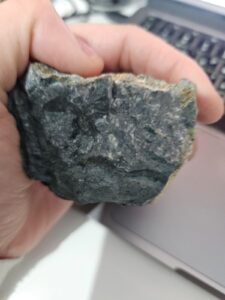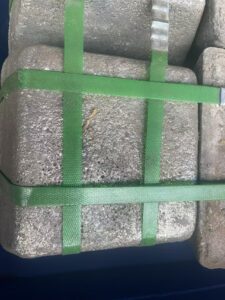Alphamin Resources’ (TSXV:AFM) (JSE: APH) tin mine in North Kivu, DRC, will soon become one of the top five tin producers in the world.
Alphamin’s rise through the ranks of top global tin miners was expected. However, the mine’s elevation as a prime mover happened only a year after hot commissioning. This year, Alphamin’s mine will challenge Renison, a tin operation in Tasmania, Australia, as the sixth largest tin mine in the world. Renison, 50% owned by Metal X, is in the process of a new optimisation study and life of mine (LOM) plan. The ASX listed group hopes to increase Renison’s current production of about 7,000t of tin-in-concentrate per year, to more than 10,000t per year from the middle of 2025. In contrast to Alphamin, where operations kicked off a little more than a year ago, Renison started mining in the early 1950s. Alphamin is targeting approximately 12,000t of contained tin per annum within the next two years. The mine has reached the 10,000t of contained tin per year mark reasonably quickly under extreme difficult operating conditions, Covid-19-restrictions, and initial teething problems.
Alphamin’s real strength lies in its superior geology. Moreover, the grades at Alphamin are spectacular and almost unheard of. While there are questions about the DRC as a jurisdiction, Alphamin’s management are adept at operating in the DRC and having grades of more than 4% Sn clearly offsets country risk and logistical challenges. Renison, as a direct comparison, for example, operates in a less risky environment but only mines average grades of close to 1.45% Sn. Alphamin recently entered what management referred to as a lower grade area in its underground mine, and still averaged about 3.5% Sn. “However, the mining team has started moving into higher grade areas already,” Alphamin said in a statement.
Alphamin is currently only mining Mpama North, the orebody historically targeted by artisanal miners. Although some drilling programmes were done with success at a second orebody only 800m away from the processing plant, Mpama South, the size and quality of the orebody remains an unknown. The company has not done enough exploration drilling to confidently map out the true value of what lies beneath the leached soil of the Congo rainforest in and around the hill of Alphamin. Optimistic geologists believe that Mpama North is only the ears of the hippo, and that the deposit extends far beyond what is currently known, towards Mpama South, which could be even bigger than Mpama North. In addition to Mpama North and Mpama South, Alphamin has identified five more geological targets that it hopes to drill in the future. The immediate goal, however, is to optimise Mpama North and to ensure that the mine operates at full capacity.
Free cash allows for investment in growth projects
Alphamin’s recent debt reduction and restructuring exercise has given management breathing space and allowed them to invest in several growth projects, including additional exploration drilling. With a strengthened balance sheet and more free cash, the company should be able to invest more into exploration programmes and life-of-mine extensions. According to Maritz Smith, CEO of Alphamin, a resource drilling plan has been finalised for Mpama South. “The resource drilling campaign is planned at $0,4 million per month and expected to commence in H2 2020 for 6 months,” Smith said. In addition, Alphamin will undertake underground extensional drilling at Mpama North in 2021 to extend the life-of-mine, while the company plans to construct access roads to the other highly prospective exploration targets adjacent to the existing mining permit area at the end of 2020 and 2021. For now, though, the company remains focussed and its immediate objective is to increase production from underground mining and to ensure that the plant operates at close to maximum capacity. According to Smith, the team will continue to focus on process plant improvements and debottlenecking to increase recoveries and to be able to handle higher volumes from underground mining. “Furthermore, we will be pursuing value add initiatives, which includes a relatively small fine tin recovery plant, to maximize plant recovery as well as extensional resource drilling to add to the life of mine, while continuing to foster strong relationships with key stakeholders in the DRC, in particular in the local communities of the project affected areas as well as with provincial and national government stakeholders,” says Smith.
A modern mine with a social conscience
In a world where social and environmental concerns top virtual agendas, and affects the bottom line, Alphamin is leading the pack of modern mining companies with a social and environmental conscience. It operates in one of the least developed, most impoverished regions in the world. In addition, the eastern parts of the DRC have been a hotspot for rebel activity in the Great Lakes region. Past insurgencies in North Kivu and sections of Walikale territory (where Alphamin is located) have caused enormous social, health and political problems. Add to that intermittent outbreaks of Ebola and the recent effects of Covid-19 lockdowns and restrictions, and you have one of the most challenging and constrained environments to operate in. The transformation of Walikale as a result of the development of Alphamin, nonetheless, is arguably Alphamin’s greatest achievement and should be enough reason for investors with a social conscience to put their money where their mouths are. In a recent interview at the DRC Mining week conference, which was held virtually, Boris Kamstra, Executive Director at Alphamin, said that he has seen significant changes in all aspects of life in the Walikale region. Kamstra has been involved with the Alphamin project since inception, and until recently, held the position of CEO of Alphamin.
“The spirit, drive and dedication to acquire new skills and hospitality of our hosts has been a material component of our success. It gives me great joy to see men who were once manual labourers now sitting behind a wall of computer screens as efficient plant control room operators, and this is just one example of what is possible” said Kamstra.
Rewards in the DRC can be substantial
Ironically, Alphamin’s remote location was a great benefit during the Covid-19 pandemic. Because of the limited movement of people in and out the area, the mine remained fully operational throughout the global crisis, although expatriate workers could not fly in and out of the DRC. Many other tin mines around the world were forced to temporarily shut down due to a number of virus outbreaks amongst their ranks.
Investing in the DRC was always going to be controversial. Political and regulatory risks remain a concern, and investors should be aware that certain parts of the country are still regarded as post-conflict fragile regions. However, the rewards in high-risk countries often exceed expectations. In a post-Covid-19 world, there is a strong appetite amongst investors looking for new ground to explore, and the DRC, with its incredibly rich mineral endowment, is expected to become a high growth country in the next few years, despite its challenges.
Kamstra said in his interview: “We are bullish on the DRC and believe in its potential.”
In a new world of uncertainty, those mining companies that have strong management, that has reduced their debt and are well funded, will thrive. Alphamin ticks all these boxes and it is therefore no surprise that they are looking for new opportunities. They have operated in the DRC for long enough to know what to expect and how to negotiate troubled waters.
Debt reduced with more than 31%
The company recently raised enough funds to slash its debt with more than 31%, resulting in reduced interest rates on the outstanding balance, improved debt covenants and a softer repayment profile. The non-brokered private placement, during which Alphamin issued more than 310 million common shares at a price of C$0.14, could not have come at a better time for Alphamin. Proceeds from the transaction added up to more than $31-million, which has allowed Alphamin to reshape its debt profile.
The successful issuing of shares has put Alphamin in a much better position to negotiate improved debt terms with its lenders. The new terms include an interest rate cut from 14% down to just over 10%, and a significant reduction of the company’s debt obligations for 2020. It means that Alphamin has moved the required tin price to service their debt from just over $16,000 per tonne down to $12,000 per tonne in the first quarter and the company’s AISC (All-in-sustainable-cost) was brought down further to $10,849/tonne in the second quarter. This has given the company renewed confidence to kickstart its value-add initiatives and should the tin price drop after the significant gains of the past few months, the company has the necessary resilience to overcome the downturn.
While tin mines throughout the world struggle to find their feet, Alphamin continues chipping away at their short-term goals. The company’s two-year strategy to eventually deliver more than 12,000t of contained tin per annum, is well within reach. This of course, will elevate Alphamin and bring them one step closer to become one of the top tin mines in the world.
On the 8th of July, Alphamin Resources’ (TSXV:AFM) (JSE: APH) published their interim results. The results showed an increase of 29% in tin production, a double digit improvement in the AISC tin costs and EBIDA of $12,900 (+2% q.o.q). Click here to read the full announcement
If you would like more information about Alphamin Resources, please leave your details below and we will contact you.








